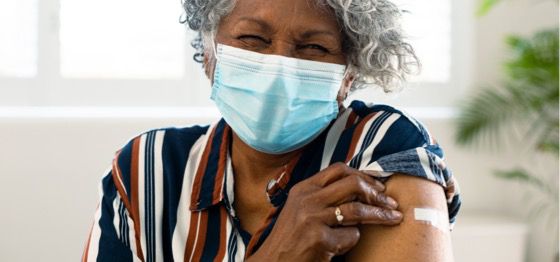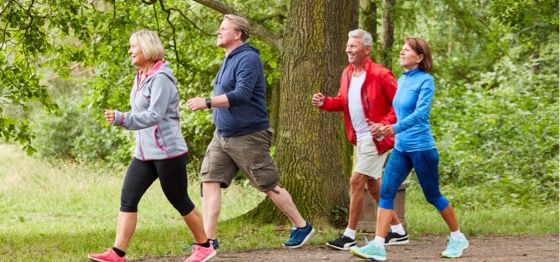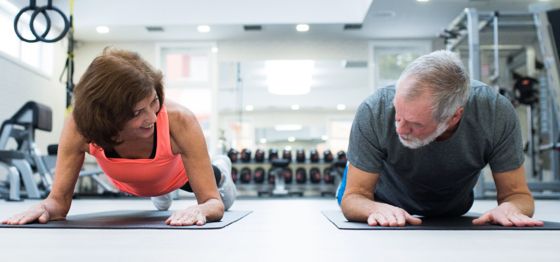For older adults, staying socially, mentally and physically active may be key to maintaining a good quality of life as they age.1 Healthy habits that prevent illness and promote vitality may help seniors feel good, engage with their favorite activities and stay connected with family, friends and community.
8 health tips for older adults:
- Get (or stay) active. Activity doesn’t have to be strenuous to be effective. Consider biking, walking, swimming or low-impact aerobics. While a total of 150 minutes per week (20 to 30 minutes per day) of moderate-intensity aerobic exercise (brisk walking, biking, housework or gardening) is recommended, exercise routines should be modified to fit into an individual’s schedule and take into account a doctor’s advice.2 In addition to aerobic exercise, the National Institutes of Health recommends:3
- Activities to strengthen muscles.
- Activities to improve balance.
- Activities to increase flexibility.
- “Multicompetent” activities that combine, for example, aerobic and muscle strengthening (water aerobics) or balance and flexibility (yoga).4
- Take supplements. Consult with a doctor about supplements that are safe and effective for supporting overall health and a robust immune system. It is particularly important to get the advice of a doctor or pharmacist before adding supplementation to a regimen that already includes prescription medication.5 Some commonly recommended supplements for older adults include calcium, vitamin D, vitamin B6, vitamin B12 and folate.6
- Eat a healthy diet. Consider eating more fruits and vegetables, whole grains, seafood and lean meats. Consume fewer sugary or fatty foods and drinks.7 Fruits and vegetables, in particular, are also good sources of antioxidants, which protect cells from damage and support overall health.8
- Wash hands frequently. Viruses can live on surfaces up to 24 hours. Touching a virus-covered surface may contaminate hands, which often transfers the virus to the face where it finds a receptive environment in the nasal or throat tissues. The best hand-washing routine involves using warm, soapy water for at least 20 seconds and washing often throughout the day. Antibacterial hand sanitizer may be a good supplement to hand washing, but is not a substitute. Disinfect surfaces around the home frequently, and avoid touching the face, mouth or nose as much as possible.9
- Manage stress. Stress may actually make a person sick. The stress hormone cortisol may disrupt multiple body functions, including the immune system. Chronic stress increases the body’s production of cortisol. Reduce stress by increasing physical activity, good quality and amount of sleep, setting reasonable expectations about what can be accomplished in a day, and making time for relaxation and enjoyable activities.10
- Get plenty of sleep. Sleep is when the body repairs itself. Good quality sleep may improve memory and concentration, as well as strengthening the immune system. A good amount of sleep, according to many sources, is at least 7 to 9 hours per night.11 For those having trouble sleeping it may be wise to consult a doctor. Insomnia may be caused by something easy to adjust, such as too little physical activity during the day or too much caffeine.12
- Prevent infections. Staying up to date on vaccinations may provide peace of mind as well as immune system support. Stay aware of the latest COVID-19 boosters as they become available and remember that flu season is October through May in the United States. Flu vaccinations may reduce the risk of catching the flu by 40 to 60% and are effective within 2 weeks of receiving the shot.13 Because the flu virus changes each year it is important to get a flu vaccination annually. For those 65 or older, talk to a doctor about a high-dose or adjuvant flu vaccine, as well as pneumococcal vaccines to protect against pneumonia and meningitis.14
- Schedule annual physicals. Develop and maintain a relationship with a doctor and see them regularly—at least annually—for a checkup and consultation. Regular physical examinations make it possible for conditions like diabetes and high blood pressure to be diagnosed early. Early treatment may prevent long-term complications.15 If cold or flu symptoms develop, seeing a doctor within the first 48 hours may allow them to prescribe an antiviral to reduce the severity and length of symptoms. Because the immune system weakens with age, those over 65 may have a harder time fighting off the virus, which can lead to complications.16
More health tips for older adults
Be social. Regular interaction with friends—not just family members—may help ward off depression. Senior groups, hobby clubs and events provide opportunities to engage and socialize. Social workers and therapists can also provide beneficial interaction as well as education about preventing or treating cognitive issues, depression, PTSD and OCD.17
Healthy habits start at home. If the home environment is not supporting a wellness-oriented lifestyle, it may be time for a change. Consider renovations to an existing home to make a healthy routine easier, or possibly hiring in-home care to help older adults with activities of daily living. Assisted living options may also be available.18
Healthy habits like maintaining social connections, staying physically active and supporting a strong immune system through good nutrition and regular visits to the doctor may help seniors enjoy a better quality of life. Even a few small changes can make a big difference.19
Go365 by Humana® makes wellness fun and easy. We help Humana Medicare members with Go365® on their plan reach health goals as well as take care of their physical and emotional health—allowing members to thrive at any age.
Humana Medicare members with Go365 on their plan can enroll in Go365 at
Go365 is a well-being and rewards program for many Humana Medicare Advantage members. To learn more about Humana Medicare Advantage, call to speak with a licensed Humana sales agent at 1-844-321-5843 (TTY:711), Monday – Friday, 8 a.m. – 8 p.m. local time or visit
If you need to enroll in Medicare Advantage or change your plan outside of the usual Medicare Annual Election Period, a Special Election Period (SEP) could be the answer. For information on eligibility, visit Humana’s
Sources:
1“Senior Wellness Tips for Aging Well,” Mind & Mobility, last accessed September 27, 2022,
2“The Senior’s Guide to Staying Healthy Year-Round,” Healthline, last accessed September 27, 2022,
3“Health Tips for Older Adults,” National Institutes of Health, last accessed September 27, 2022,
4“Health Tips for Older Adults.”
5“The Senior’s Guide to Staying Healthy Year-Round.”
6“Health Tips for Older Adults.”
7“Health Tips for Older Adults.”
8“The Senior’s Guide to Staying Healthy Year-Round.”
9“The Senior’s Guide to Staying Healthy Year-Round.”
10“The Senior’s Guide to Staying Healthy Year-Round.”
11“The Senior’s Guide to Staying Healthy Year-Round.”
12“The Senior’s Guide to Staying Healthy Year-Round.”
13“The Senior’s Guide to Staying Healthy Year-Round.”
14“The Senior’s Guide to Staying Healthy Year-Round.”
15“The Senior’s Guide to Staying Healthy Year-Round.”
16“The Senior’s Guide to Staying Healthy Year-Round.”
17“Senior Wellness Tips for Aging Well.”
18“Senior Wellness Tips for Aging Well.”
19“The Senior’s Guide to Staying Healthy Year-Round.”
Go365 is not an insurance product and is not available with all Humana health plans. This is a general description of services which are subject to change. Product features may vary by client. Please refer to Customer Support for more information.
Humana is a Medicare Advantage HMO, PPO and PFFS organization and a stand-alone prescription drug plan with a Medicare contract. Humana is also a Coordinated Care plan with a Medicare contract and a contract with the state Medicaid program. Enrollment in any Humana plan depends on contract renewal.






